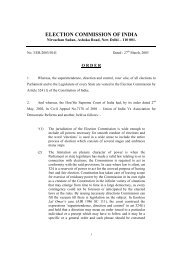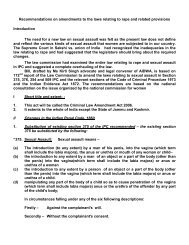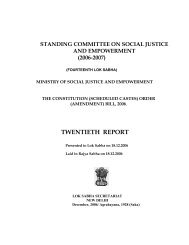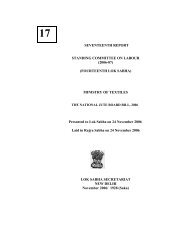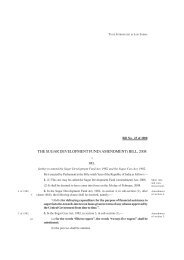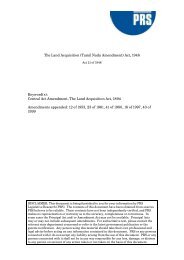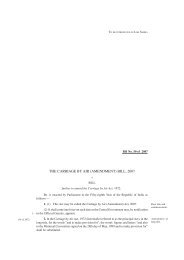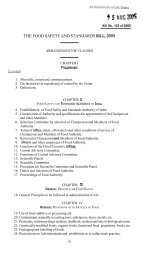Report of the Tiger Task Force - PRS
Report of the Tiger Task Force - PRS
Report of the Tiger Task Force - PRS
Create successful ePaper yourself
Turn your PDF publications into a flip-book with our unique Google optimized e-Paper software.
■ JOINING THE DOTS TIGER TASK FORCE REPORTRecommendations1. The regulation and management <strong>of</strong> tourism in tiger reserves must remain in <strong>the</strong> charge<strong>of</strong> <strong>the</strong> forest department. The Ranthambhore experience clearly shows that touristinterests, if allowed to take precedence over conservation, can be extremely detrimentalto <strong>the</strong> park. If <strong>the</strong> park management does not have <strong>the</strong> capacities to manage tourism,efforts must be made to involve local communities and staff welfare associations in <strong>the</strong>running <strong>of</strong> affairs. These interested communities will bring benefits to <strong>the</strong> conservationefforts in <strong>the</strong> park for <strong>the</strong>ir interests are enjoined with its protection. Under nocircumstances should <strong>the</strong>re be any move to ‘privatise’ <strong>the</strong> park management for tourismactivities.2. The zone adjacent to <strong>the</strong> park — its fringe and high impact zone — must be reservedfor homestead-based tourism run at a small scale by local communities. This zone shouldideally extend up to three km from <strong>the</strong> outer periphery <strong>of</strong> a reserve’s boundary. In case itis not possible to extend this zone up to three km, <strong>the</strong> reserve management must decidehow far <strong>the</strong> zone should extend, after due consultation with <strong>the</strong> Project <strong>Tiger</strong> directorate.3. All o<strong>the</strong>r resorts and hotels can only be allowed beyond this zone reserved forhomestead tourism. This ‘reservation’ will promote alternative tourism and provide foropportunities for local communities to directly benefit from this economic activity.4. The Union ministry <strong>of</strong> environment and forests must finalise an eco-tourism policyfor tiger reserves that incorporates this land-use reservation into <strong>the</strong> EnvironmentProtection Act, 1984.5. Reserve managements must increase gate ticket prices by imposing an ecological cess,which must be ploughed back to each reserve. Ideally all gate money should go back to <strong>the</strong>reserve. But given <strong>the</strong> requirements <strong>of</strong> state governments, this may not be possible. In thiscase, <strong>the</strong> extra revenue collected as ecological cess should be given to <strong>the</strong> reserve,explicitly to be shared with local communities who continue to live within its boundariesand for staff benefits.6. Hotels within a radius <strong>of</strong> 5 kilometres from <strong>the</strong> boundary <strong>of</strong> a reserve must contribute30 per cent <strong>of</strong> <strong>the</strong>ir turnover to <strong>the</strong> reserve. This has to be a compulsory cess on <strong>the</strong> hotelindustry, for this industry is drawing advantages out <strong>of</strong> investment made from publicfunds for <strong>the</strong> protection <strong>of</strong> reserves. The hotels can be allowed to claim 100 per centincome tax benefit for <strong>the</strong> same, as an incentive.7. The tourism plan for each reserve must be developed and approved by <strong>the</strong> Project<strong>Tiger</strong> directorate. The plan must designate <strong>the</strong> tourism zones, clearly demarcate <strong>the</strong>zoning plan and be based on carrying capacity studies. The plans must be available in <strong>the</strong>public domain along with all tourism-regulating rules.8. The reserve must ensure that all possible avenues <strong>of</strong> engaging local communities areexhausted before it resorts to using o<strong>the</strong>r resources as guides and for o<strong>the</strong>r employmentand work opportunities.9. The pilgrim sites inside <strong>the</strong> park must be designated as sacred groves with strictcontrols and regulations. All transit camps and places <strong>of</strong> stay for such pilgrimages inside<strong>the</strong> park must be minimised and severely restricted. The benefits <strong>of</strong> <strong>the</strong> pilgrimageactivity must accrue to local communities. The temple boards must be persuaded to allowthis to happen.140 The way ahead



